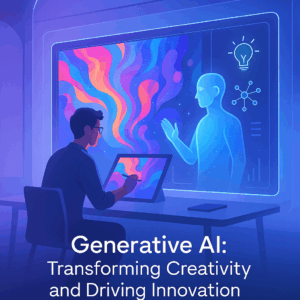The Quantum Leap: Unlocking the Power of Quantum Computing

In the sprawling cosmos of contemporary tech, few advancements captivate the imagination like quantum computing. Operating on principles diametrically different from classical computers, quantum technology promises transformative changes across industries—from cryptography and pharmaceuticals to finance and artificial intelligence. This quantum revolution is not merely an evolutionary step but a seismic shift, heralding a future where complex computations once considered infeasible become routine.
Quantum computers leverage the enigmatic properties of quantum bits or qubits. Unlike classical bits that cling stubbornly to binary states—zero or one—qubits inhabit a realm of superposition, simultaneously existing in multiple states. This phenomenon, combined with entanglement, where qubits instantaneously influence each other regardless of distance, equips quantum machines with an unparalleled computational density. For example, while a 64-bit classical computer processes one configuration at a time, a 64-qubit quantum computer processes an astronomical number, accelerating calculations exponentially.
Revolutionizing Real-World Applications
Cutting-edge sectors are already exploring quantum computing’s capabilities. In pharmaceuticals, simulating molecular interactions with high precision accelerates drug discovery, a process previously constrained by classical computational limits. Early successes in simulating relatively simple molecules hint at a future where tailored medicines could be designed swiftly, reducing time-to-market dramatically.
Financial institutions are experimenting with quantum algorithms to optimize portfolio management, risk analysis, and fraud detection. The inherent parallelism promises to analyze massive datasets and complex market variables with newfound efficiency, revealing insights that conventional methods might overlook.
Artificial intelligence, a cornerstone of modern tech, stands to gain transformative enhancements. Quantum machine learning could enable more sophisticated neural networks and pattern recognition, dramatically improving learning speed and accuracy. This synergy between quantum computing and AI could unlock new frontiers in autonomous systems and predictive analytics.
Cryptography, traditionally a fortress of digital security, faces an intriguing paradox. Quantum computers can break many classical encryption schemes, jeopardizing current cybersecurity architectures. Yet, this thrust has led to the emergence of quantum-resistant cryptography—algorithms designed to be impervious to quantum attacks—ensuring a dynamic evolution in protecting digital information.
Impact on Society and Industry
Quantum computing’s leap into the mainstream tech ecosystem will spur profound societal and industrial transformations. Industries adopting quantum solutions will gain strategic advantages, fostering innovation, transparency, and efficiency. For example, logistics companies might optimize complex supply chains in real time, reducing waste and accelerating delivery.
However, the societal ramifications are double-edged. On the one hand, quantum-enhanced AI could lead to breakthroughs in healthcare diagnostics, climate modeling, and even efforts to combat global challenges such as pandemics. On the other hand, the uneven pace of adoption risks widening the technology gap between nations and corporations, intensifying digital inequality.
Ethically, quantum technology compels us to reassess frameworks around data privacy, security, and control. As the power to solve problems increases, so does the potential for misuse—whether through decoding sensitive information or developing autonomous systems with profound autonomy. Policymakers and technologists must collaboratively devise robust governance to mitigate risks while fostering responsible innovation.
Key Innovators Steering the Quantum Wave
Trailblazers in both academia and industry tirelessly shape quantum computing’s trajectory. Google’s Quantum AI lab ignited global attention in 2019 by demonstrating “quantum supremacy” through a device performing a specific task faster than any classical supercomputer. While this marked a proof of concept, practical quantum advantage across diverse applications remains an ongoing quest.
IBM, a pioneer in cloud-based quantum services, offers public access to quantum processors, democratizing experimentation and education. Their roadmap outlines a future entailing scalable qubit arrays and error correction—critical milestones toward reliable quantum machines.
Rigetti Computing stands out as a startup blending hardware innovation with cloud integration, aggressively pushing hybrid quantum-classical computing paradigms. Meanwhile, Chinese institutions like Alibaba and the University of Science and Technology of China have made significant strides, reflecting a global, multipolar race.
Beyond these protagonists, the involvement of government-funded initiatives—such as the U.S. National Quantum Initiative and the European Quantum Flagship—signals the strategic importance accorded to quantum technology worldwide. These collaborations accelerate breakthroughs and cultivate the necessary ecosystem of talent and infrastructure.
Future Trajectory: Navigating Challenges and Opportunities
Despite its promise, quantum computing confronts formidable technical hurdles. Qubit decoherence—the tendency for qubits to lose their quantum state via environmental interaction—remains a critical bottleneck. Error rates are orders of magnitude higher than classical systems, necessitating sophisticated quantum error correction to achieve fault-tolerant machines.
Scaling quantum processors to hundreds or thousands of qubits while maintaining coherence is a colossal engineering feat. Materials science, cryogenics, and control electronics converge in a symphony of innovation to address these challenges.
Looking ahead, hybrid models combining classical and quantum computers may dominate the landscape, harnessing quantum acceleration for specific subroutines while relying on classical hardware for overall control. Software development tailored for quantum architectures is emerging, fostering new programming languages, algorithms, and tools to harness qubit potential efficiently.
On a societal level, comprehensive frameworks for regulation, ethics, and workforce development must evolve alongside technological advancements. As quantum computing transitions from novelty to necessity, education systems must prepare a new generation fluent in quantum principles, ensuring equitable participation in this tech frontier.
“Quantum computing will not just change the world; it will redefine the very notion of what is computable,” remarked a leading figure in the field. This singular technology embodies the intersection of theoretical physics, engineering prowess, and visionary ingenuity—pushing the boundaries of human capability.
In the grand theater of technology’s evolution, quantum computing stands as a beacon of transformative promise. It compels industries to rethink processes, societies to reconsider values, and innovators to envision horizons beyond classical limitation. As this remarkable journey unfolds, its ripple effects will shape not only machines and markets but the very fabric of human progress.

